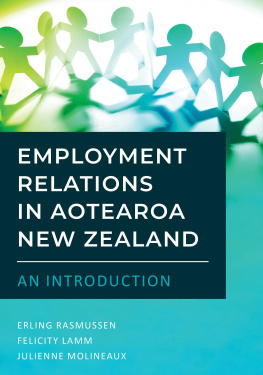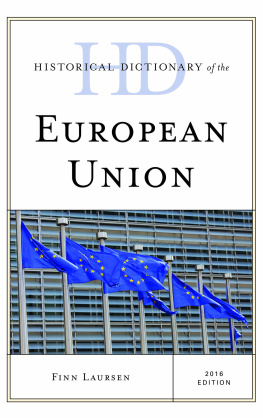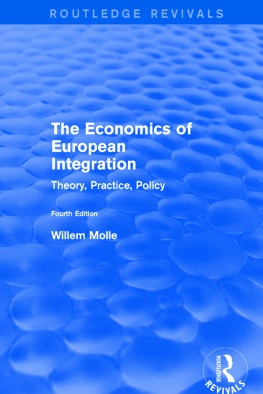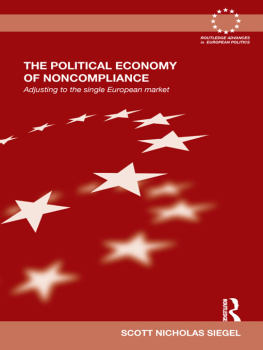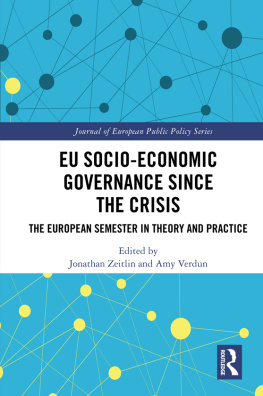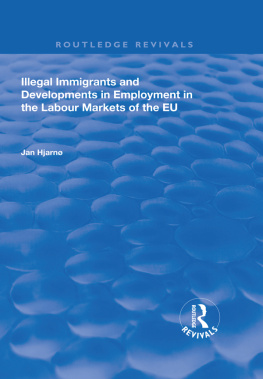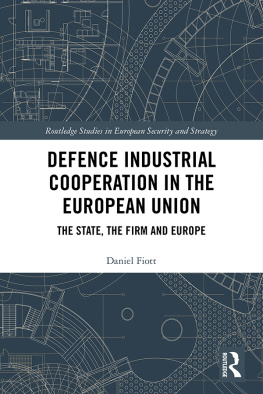INDUSTRIAL RELATIONS AND EUROPEAN INTEGRATION
Industrial Relations and European Integration
Trans- and Supranational Developments and Prospects
Edited by
Berndt Keller
University of Konstanz
Hans-Wolfgang Platzer
University of Applied Sciences, Fulda
First published 2003 by Ashgate Publishing
Reissued 2018 by Routledge
2 Park Square, Milton Park, Abingdon, Oxon OX14 4RN
711 Third Avenue, New York, NY 10017, USA
Routledge is an imprint of the Taylor & Francis Group, an informa business
Copyright Berndt Keller and Hans-Wolfgang Platzer 2003
Berndt Keller and Hans-Wolfgang Platzer have asserted their right under the Copyright, Designs and Patents Act, 1988, to be identified as Editors of this work.
All rights reserved. No part of this book may be reprinted or reproduced or utilised in any form or by any electronic, mechanical, or other means, now known or hereafter invented, including photocopying and recording, or in any information storage or retrieval system, without permission in writing from the publishers.
Notice:
Product or corporate names may be trademarks or registered trademarks, and are used only for identification and explanation without intent to infringe.
Publisher's Note
The publisher has gone to great lengths to ensure the quality of this reprint but points out that some imperfections in the original copies may be apparent.
Disclaimer
The publisher has made every effort to trace copyright holders and welcomes correspondence from those they have been unable to contact.
A Library of Congress record exists under LC control number: 2002190866
ISBN 13: 978-1-138-71181-5 (hbk)
ISBN 13: 978-1-315-19890-3 (ebk)
Contents
Berndt Keller and Hans-Wolfgang Platzer
Gerda Falkner
Berndt Keller
Torsten Muller and Hans-Wolfgang Platzer
Franz Traxler
Thorsten Schulten
Janine Goetschy
Berndt Keller and Hans-Wolfgang Platzer
Guide
Dr. Gerda Falkner, Research Group Director, Max Planck Institute for Social Research, Cologne, Germany, and Head of Department of Political Science, Institute for Advanced Studies, Vienna, Austria.
Janine Goetschy, Researcher, CNRS - University of Nanterre, France, and Brussels, Belgium.
Dr. Berndt Keller, Professor, University of Konstanz, Germany.
Torsten Mller, M.A., Researcher, Fulda University of Applied Sciences, Germany.
Dr. Hans-Wolfgang Platzer, Professor, Fulda University of Applied Sciences, Germany.
Thorsten Schulten, Researcher, Economic and Social Research Institute (WSI), Hans-Boeckler Foundation, Dsseldorf, Germany.
Dr. Franz Traxler, Professor, University of Vienna, Austria.
The editors would like to express their thanks to the Brussels office of the Friedrich Ebert Foundation for its financial and organisational assistance in enabling a meeting of the authors to take place in Brussels in the autumn of 2001. We are also grateful to the Hans Bckler Foundation for its financial support, and to Pete Burgess for technical and English language oversight. Finally, we are indebted to the authors for their wholehearted cooperation and faultless delivery to our deadline.
Berndt Keller, Hans-Wolfgang Platzer
- ASEAN Association of Southeast Asian Nations
- BDA Bundesvereinigung der Deutschen Arbeitgeberverbnde (German Confederation of Employers' Associations)
- CBI Confederation of British Industry
- CEEP European Centre of Enterprises with Public Participation and Enterprises of General Economic Interest
- DGB Deutscher Gewerkschaftsbund (German Trade Union Confederation)
- ECB European Central Bank
- ECOFIN Council of Economic and Finance Ministers
- EEA European Economic Area
- EEC European Economic Community
- EEN European Employers' Network
- EES European Employment Strategy
- EFBWW European Federation of Building and Woodworkers
- EFJ European Federation of Journalists
- EIF European Industry Federation
- EMCEF European Mine, Chemical and Energy Workers' Federation
- EMF European Metalworkers' Federation
- EMU Economic and Monetary Union
- EPC Economic Policy Committee
- EPSU European Federation of Public Service Unions
- ESF European Social Fund
- ETF European Transport Workers' Federation
- ETUC European Trade Union Confederation
- ETUI European Trade Union Institute
- EU European Union
- EUCOB@ European Collective Bargaining Information Network
- Euro-FIET European section of the International Federation of Commercial, Clerical, Professional, and Technical Employees FIET (now part of Uni-Europa)
- EWC European Works Council
- IG BAU Industriegewerkschaft Bau, Agrar, Umwelt (Trade Union for Construction, Farming and the Environment) (Germany)
- IG BCE Industriegewerkschaft Bergbau, Chemie, Energie (Trade Union for Mining, Chemicals, Energy) (Germany)
- IGC Intergovernmental Conference
- IUF International Union of Foodworkers
- JAP Joint Assessment of Employment Policy
- NAFTA North American Free Trade Agreement
- NAP National Action Plan
- NBTF Nordic Building and Woodworkers Federation
- OECD Organisation for Economic Cooperation and Development
- OMC Open Method of Coordination
- SE Societas Europaea (European Company)
- SEA Single European Act
- SME Small and Medium Sized Enterprise
- SNB Special Negotiating Body
- TEC Treaty Establishing the European Community
- TEU Treaty on European Union
- TEN Trans-European Networks
- UNICE Union of Industrial and Employers' Confederations of Europe
- UNI-Europa Union Network Europe
Chapter 1
Introduction
The Europeanisation of Industrial Relations
Berndt Keller and Hans-Wolfgang Platzer
European integration, although from its inception both an economic and a political project, has been driven predominantly by economic interests and means. Since the 1970s one key rationale of European market-building has been the aggregation of the patchwork of Europe's national economies into a single bloc as an effective counterweight to the challenges of global economic competition (vis--vis North America and the Asia-Pacific region). In this respect, European integration can be seen as both a response to economic internationalisation and a means of reinforcing it. Following the completion of the Single Market in the early-1990s and the inauguration of Economic and Monetary Union (EMU) in the late-1990s, economic integration within the EU has attained a unique quality when compared with all previous stages of European economic and political integration, as well as with other regional trading blocs such as NAFTA or ASEAN.
Against this background, and specifically the impact of rapidly advancing European integration on industrial relations, the emergence of a broad political and academic debate on the issue of industrial relations and European integration, which has gathered ground in particular since the 1990s, is unsurprising.


